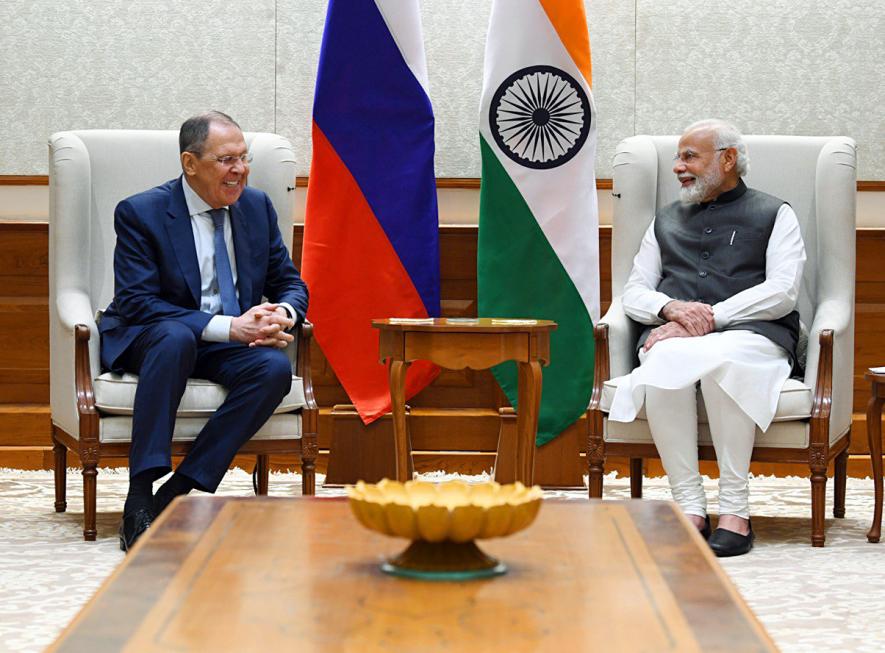India’s Dilemma Over West vs Russia

There is a notion among some mainstream Indian strategic analysts, including some who held top positions in the security establishment in past regimes, that what is unfolding in Ukraine is quintessentially “a war between Europeans over the European security order.”
No matter the basis of this notion, such contrived naïveté can do incalculable damage to India’s strategic planning in the 21st century. Will the war change the fundamental geopolitical dynamic in Asia? There’s no question that it will. But Indian analysts take a tunnel vision that this conflict in Ukraine may cause ‘distraction’ from Washington’s Indo-Pacific strategy.
That is to say, the Indian commentariat views the looming US-Russia confrontation along the Dniepr River as draining Washington’s “energy to take an active or meaningful role in security dilemmas in Asia so long as it is preoccupied with containing Russia in Europe.”
Prima facie, this may seem a rational argument. For, there are indeed signs of great fragmentation within the European order itself. Poland and Lithuania are out on a limb; Germany is embarking on a path of militarism (with implications and consequences for the European order that are still to be understood); France under Emmanuel Macron vacillates between a posturing of proto-Gaullism and pristine Euro-Atlanticism; and all this, while the German-French axis of the era of Angela Merkel (“Frau Europa”) is receding. Indeed, to cast the Ukraine conflict as a global Manichean struggle is futile, since there is nothing like evil and good absolutes in politics.
However, what Indian analysts fail to grasp is that the Ukraine conflict is in reality a template of the Indo-Pacific strategy. Equally, it is also a fact of history that Manichean allegories — “democracy versus autocracy” in the present case — have a way of surging in the dominant and hegemonic phases of imperialism. For India, in particular, extending from its independence in 1947 to the present, the current hegemonic phase of world politics can even be described as neo-colonialism.
Two remarkable events would help explain why India needs to be clear-headed. One was the customary press conference on Tuesday by the NATO secretary-general Jens Stoltenberg on the eve of the two-day meeting of the alliance’s foreign ministers (April 6-7) in Brussels.
The second was, again on Tuesday, a stunning testimony given by the commander of the United States Strategic Command Admiral Charles Richard at a classified hearing of the Defense Appropriations Subcommittee of the Congress in Washington against the backdrop of the current Russian nuclear posture, the crisis in Ukraine that impacts national security strategy, etc.
The current NATO ministerial in Brussels is taking place as a crucial phase of the Russian operation in Ukraine is about to begin. Stoltenberg said the NATO allies are “determined to provide further support” to Ukraine, including weaponry, humanitarian assistance and financial aid, cybersecurity assistance, etc.
Furthermore, he said, the ministerial will discuss work to develop NATO’s next Strategic Concept for the Madrid Summit in June, disclosing also that “For the first time, it (NATO summit) will also need to take account of China’s growing influence and coercive policies on the global stage. Which pose a systemic challenge to our security, and to our democracies.”
Admiral Richard’s Congressional testimony, on the other hand, was in stark and graphic detail regarding the “systemic challenge” posed by China. He said China “continues the breathtaking expansion of its strategic and nuclear forces with opaque intentions as to their use.” Importantly, the admiral underscored,
“The strategic security environment is now a three-party nuclear-peer reality, where the PRC and Russia are stressing and undermining international law, rules-based order, and norms in every domain. Never before has this Nation simultaneously faced two nuclear-capable near-peers, who must be deterred differently… Today, both the PRC and Russia have the capability to unilaterally escalate a conflict to any level of violence, in any domain, worldwide, with any instrument of national power, and at any time.”
“They (China and Russia) will continue to expand and diversify their nuclear forces over the next decade and the PRC, in particular, will increase the role of nuclear weapons in its defence strategies. The range of their new systems complement growing nuclear stockpiles, and includes the development and modernisation of survivable nuclear triads, counter-intervention, and power projection capabilities intended to deter and deny our regional influence…
“They are also pursuing leadership in key technologies with significant military potential including, artificial intelligence (AI), autonomous systems, advanced computing, quantum information sciences, biotechnology, and advanced materials and manufacturing.”
As for Russia, the admiral highlighted its “novel and advanced weapon delivery systems, many of which are capable of hypersonic speeds and flight path adjustments designed to avoid US missile defence systems… Russia (also) … claims to have already completed serious research and technological groundwork on pieces of equipment that have no counterpart in the world. They continue to develop additional strategic systems with new hypersonic warheads to expand the range of threats against the US.”
The admiral’s conclusion was two-fold: firstly, the US is no longer facing “a singular operational problem set but must consider two nuclear-capable near-peers simultaneously,” and secondly, China and Russia “actively seek to change the international rules-based order, while the US, with our Allies and partners, seek to defend it.”
In geopolitical terms, what does this imply? Succinctly put, the outcome of the conflict in Ukraine is of critical importance because the world is watching. Russia’s defeat at the hands of a strong, united West would force a rethink in the (non-Western) international community about US commitment and competence and reverse the global perceptions of declining transatlantic influence and relevance in the 21st century, whereas, conversely, any failure to defeat and weaken Russia would inevitably accelerate Western decline as an effective global actor.
Put differently, as the president and CEO of Atlantic Council and an outspoken ideologue of unipolarity, Frederick Kempe wrote candidly last week, “the question is not what the new world order would be, but rather if the US and its allies can through Ukraine reverse the erosion of the past century’s gains as a first step toward establishing the first truly ‘global’ world order.”
It’s about unipolarity,stupid! To shape the future world order, the US and Europe first need to reverse the trajectory of Western decline. A failure in Ukraine can well mean the disintegration of EU and NATO. The patchwork cohesion within these alliances will not survive the trauma of defeat. The desperation in the West showed in the virtual summit by the EU leadership with China last week — by the way, the first China-EU summit in two years.
Equally, the ferocity of the information war over Bucha shows it. But why should there be any confusion at all in the Indian mind? Metaphorically speaking, the confusion arises because of opium consumption, as the Chinese experienced in their so-called hundred years of national humiliation. The Indian elites’ predicament is pitiable.
There are two great books on Manichean binaries by the mixed race Jamaican author Herbert George de Lisser, set in the Caribbean in the colonial era —The White Witch of Rosehall and Revenge: A Tale of Old Jamaica — where the black women’s moral compasses often stemmed from their association with white men, notwithstanding the extremely bitter and violent thoughts they eventually created when they were spurned by the white men they loved.
Get the latest reports & analysis with people's perspective on Protests, movements & deep analytical videos, discussions of the current affairs in your Telegram app. Subscribe to NewsClick's Telegram channel & get Real-Time updates on stories, as they get published on our website.























